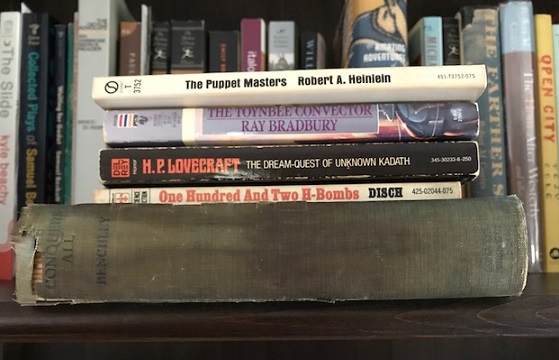Books acquired: “True Stories of Claremont, CA,” Hal Durian; “Buster Keaton Remembered,” Eleanor Keaton and Jeffrey Vance
Books read: “The Puppet Masters,” Robert Heinlein; “The Toynbee Convector,” Ray Bradbury; “One Hundred and Two H-Bombs,” Thomas M. Disch; “The Dream-Quest of Unknown Kadath,” H.P. Lovecraft; “Love Conquers All,” Robert Benchley
Greetings, readers. We’re well into fall and the end of 2017 is in sight, which is something of a relief. But that also means that if we have reading goals, time is running out on achieving them.
Of the (now) 266 unread books on my shelves, some authors are represented multiple times. I try to read at least one per year by many of them to gradually whittle down the backlog. While progress may not be as great as wished for, I looked at my row of Robert Benchley books recently and realized that after one per year for seven years, I’ve now read almost all of them.
October’s choices were made up entirely of give-or-take perennials.
From Heinlein’s classic period, his 1951 novel “The Puppet Masters” is about an alien invasion by big slugs who control individuals by (ugh) attaching themselves to humans’ spines. It’s clever, propulsive and genuinely creepy. Also, the government-mandated nudity angle was funny. Hey, how else are you going to know if your neighbor, or your congressman, is controlled by a slug nestled between their shoulder blades if you can’t see them in the buff?
Bradbury’s 1984 story collection is the last of his regular books that I hadn’t read or reread; a few years ago I picked up shortly after this point to read his copious number of late-period books that I’d never had the heart to read (most did indeed turn out to be disappointing), then started over at the beginning to reread his classic ones.
“The Toynbee Convector” is a terrible title, a tipoff of what’s to come. Of the 23 stories, only five (Trapdoor, The Love Affair, A Touch of Petulance, West of October and At Midnight, in the Month of June) have the old snap. Some of them are old but never collected, I believe.
Most of the rest are sad, aimless or eye-rollers. Unpleasantly, several semi-autobiographical stories are about an adulterer, and nine (I started keeping track, it was such a thing) involve a grown man weeping. There is some lovely writing, of course, such as about the Family, a Bradbury staple: “Some were young and others had been around since the Sphinx first sank its stone paws deep in tidal sands.” Still, as a fan, I warn you: Do not start with “The Toynbee Collector.”
I bought a bunch of Disch’s out of print books four years ago when I encountered them at a used bookstore in Goleta. Here’s the third one, an early collection of stories. Some are shaggy dog shorts, surprisingly silly for a writer who would attain Disch’s stature. The whimsical “Dangerous Flags” is a hoot. Many of the other stories are fair to good. To my mind only “The Return of the Medusae,” weighing in at a mere two pages, has a breath of mystery to it.
Lovecraft is another favorite; I read the five books by him I had, one per year, and in March bought two more to keep me going. The title novella is a 141-page dream adventure starring Randolph Carter, with no dialogue until the end and no chapter breaks; it’s appropriately strange and lovely, but conversely hard to get invested in. The remaining five stories also involve dream worlds. Worthwhile if, like me, you’re doing a deeper dive into HPL.
The essays in Benchley’s second book, from 1922, already mark him as a very funny stylist and observer of life, whether he’s writing about neighbors offering unsolicited advice as he tries to garden, contradictory exhortations from the stands during baseball games and the mental gymnastics required to translate Roman numerals. (The title, like ones to follow, gives no hint of its contents.)
“Love Conquers All” has the added bonus of a long section of his literary pieces, many of them very loose reviews of books nobody else would review, such as a train timetable, “Bricklaying in Modern Practice” and “The Effective Speaking Voice.”
I bought that one in 2001 at Pasadena’s Book Alley, the Bradbury in 1991 at Santa Rosa’s Treehorn Books, Disch in 2013 at Goleta’s Paperback Alley, Lovecraft at LA’s Last Bookstore and Heinlein sometime in the 2000s.
How was your October, reading-wise? Please let us know in the comments.
Next month: new, different authors.


